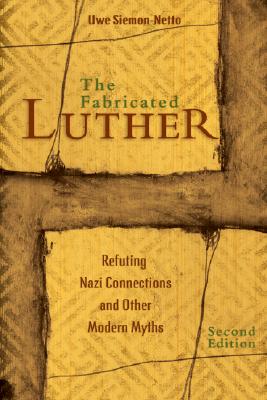 subtitle: Refuting Nazi Connections and Other Modern Myths.
subtitle: Refuting Nazi Connections and Other Modern Myths.
by Uwe Siemon-Netto
Was Luther an anti-semite?
Was Luther (and/or Lutheranism) responsible for the rise of Hitler and the acquiescence of the German people in the crimes of the Nazi’s?
Uwe Siemon-Netto is uniquely qualified as an author and a theologian to write on these topics. He gives his reasons for writing in the preface to his book:
“1) I am a journalist.” Siemon-Netto spent 50 years as a correspondent, first as a reporter on American affairs for German language publications, and then, eventually as the religious affairs editor for UPI. He covered events from the assassination of President Kennedy and the Vietnam War to the fall of the Berlin Wall in 1989 and the first Gulf War in 1991.
“2) I am a Lutheran.” Not just a nominal Lutheran – Sieman-Netto is a German-born, committed Lutheran who learned a deep faith from his devout, courageous grandmother and who at age 50 decided to pursue both ordination and earned a masters and doctorate in theology.
“3) I am a Leipziger.” Siemen-Netto was born in Leipzig in 1936. The Mayor of Leipzig (Carl Goerdeler) was a committed Lutheran Christian and a member of the “Confessing Church” in Germany (along with Dietrich Bonhoeffer and Martin Niemoeller) which resisted Hitler.
The first two chapters in the book present the problem: the association of Luther with Hitler publicized by William Shirer, Thomas Mann, and Lord Vansittart of the British Foreign Office.
The remaining three chapters demolish this cliche and show what a false picture of Luther it presents. Those who would accuse Luther of being a racist anti-semite must overlook his 1523 essay: That Jesus Christ Was Born a Jew. Here is a quote from Luther from that essay: “If I had been a Jew and had seen such dolts and blockheads govern and teach the Christian faith, I would sooner have become a hog than a Christian.”
In the remaining three chapters, Netto first examines the religious backgrounds of the Nazi leadership (none were Lutheran – Hitler, Himmler, Goebbels, and Streicher were all lapsed Catholics) as well as their stated religious convictions (they were all rabidly anti-Christian neo-pagans). Netto dryly observes that no critics appear to have blamed Hitler on Catholic theology. Netto then goes on to examine Lutheran theological teaching on obedience to authority and resistance to tyrants. In his historical analysis, Netto is able to show that Luther’s teaching is no different from Calvin’s (who is usually credited as the author of the doctrine of godly resistance).
Finally, Netto gives two historic examples of Lutheran resistance to tyranny – both historically centered on Leipzig. He analyzes at length the opposition to Hitler by the Lutheran Mayor of Leipzig, Carl Goerdeler, who was executed in February of 1945 for his part in the plot to assassinate Hitler (Dietrich Bonhoeffer was also among the conspirators who was executed). He shows convincingly, that the profound Christian faith of Goerdeler and Bonhoeffer led them to resist Hitler, rather than to acquiesce. He shows that they were the authentic heirs of Luther.
His second example is the Lutheran leadership of the resistance to the East German government in the uprisings in Leipzig in 1989. The fact that the East German government was overthrown with almost no bloodshed is remarkable. Netto documents the role played by the Lutheran church in resisting the tyranny of the communist government in East Germany. See, for example, this essay on the internet: An Introduction to the Role of the East German Protestant Church in the Peaceful Revolution of 1989.
There may have been some defect in German character or German political traditions which allowed the rise of Hitler to power and the failure to prevent his crimes – but it cannot be laid at the feet of Martin Luther. Committed Lutherans opposed Hitler. Lapsed, uncommitted, nominal Christians looked the other way. Neo-pagans and secularists supported him.
This is an important book. Those who would criticize Luther, or blame him for the rise of Hitler should read it. It will give them pause, and suggest that the responsibility for Hitler lies elsewhere.
Those interested can order the book from Greenleaf Press.
– Rob Shearer
Director, Schaeffer Study Center
Publisher, Greenleaf Press
Thanks for informing about Holy Christian book “The Fabricated Luther” and reviewing a short article on that book.